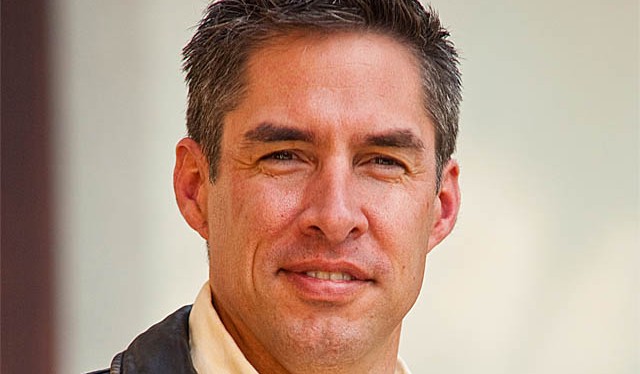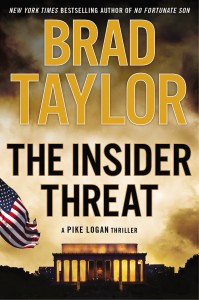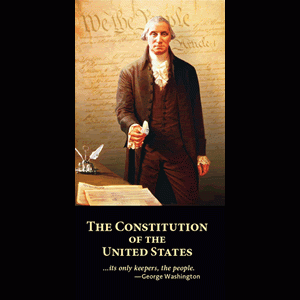The Threat of Radical Islam In the US and Abroad (Author Interview: Brad Taylor)

Congratulations on the release of your new book, The Insider Threat: A Pike Logan Thriller! Tell us what the book is about?
In a nutshell, THE INSIDER THREAT is about the threat the Islamic State poses. Outside of them rampaging about in Iraq and Syria, the biggest fear right now is radicalized citizens getting training and returning home to wreak havoc. Someone with an American passport and hardened by combat.
After studying the radicalization process, and our efforts to track and counter the same, I realized that nine times out of ten, the person traveling to Syria or Iraq may be a citizen of a western country, but he had one foot in the Middle East to begin with. He’s usually Muslim from birth, his father is from some place like Algeria, or he’s spent portions of his life in the Middle East – Anwar al-Awlaki from Yemen comes to mind – and he spends a significant amount of time during the radicalization process using social media.
I realized that the most dangerous threat was someone with no ties to the Islamic world – someone with a name like John Smith who was a blond haired, blue-eyed citizen – with no social media footprint. Someone completely under the radar, with no profile to raise attention. A person like that becoming radicalized, getting training and expertise in combat, then returning home was the greatest threat I could imagine. I set out to explore that.
The theme around your novel is the dangers that ISIS poses. Based on your vast military experience and background, what do you think the threat of ISIS presents to the US today?
In my mind, radical Islam is the most significant threat the United States faces today, and out of all of the different groups, the Islamic State is the most dangerous. Not just in the threat of another 9/11 type terrorist event, but also in its capacity to destabilize entire state systems and cause repercussions that may initiate overt hostilities between nation-states. Libya, Syria, Iraq, Yemen, Egypt, Tunisia, you name it, radical Islamists have created chaos and death.
I understand they aren’t the only threat – China is currently building and weaponizing artificial islands, and Russia and the Ukraine make the news on a daily basis – but there is a distinct difference in the makeup of the threat. There is no deterrence to radical Islam. No sanctions or saber rattling is going to make them quit, and they have a fanatical worldview that glorifies violence. China may hack our computers, and Russia may invade its neighbors, but neither would flat out encourage and enable horrific attacks in the western world as a strategy. At the end of the day, both of those countries value something greater than simply death, and we can use those levers, short of actual conflict, to manage them.
During the Cold War we had two competing theories dealing with the USSR, called counter force and counter value. Basically, should we target the USSR war making machine – ballistic missiles, airfields, etc – or should we target what the USSR valued – leadership, etc. Counter value proponents stated that taking out the leadership would render the USSR unable to launch a counter-strike, while opponents said the opposite: It would lead to a breakdown whereby missiles would be launched willy-nilly with no controls and no way to stop the violence.
That, in a nutshell, is the threat posed by the Islamic State. It encourages leaderless chaos, urging attacks worldwide without any control over the outcome, or any restraint on the level of violence. There is no negotiating or deterrence with the Islamic State. Its only solution is eradication.
If you could advise any of the 2016 presidential candidates, what would you advise about a US strategy to degrade and defeat ISIS?
First, I’d encourage them to quit talking in sound bites. The Islamic State is a complex, multi-faceted problem set with no single solution. For instance, I hear, “The Iraqi army ran, and the Kurds are fighting. We should arm the Kurds to defeat ISIS.” While I agree with the sentiment, let’s not pretend that such an act is a solution. It’s the same as watching the battle of Midway in World War II and saying, “We defeated the Japanese with our navy. We need more aircraft carriers to win the war.” Yeah, more carriers would help in the pacific, but wouldn’t do a damn thing against Germany.
By the same token, arming the Kurds will help in the north of Iraq and Syria, but it’s not a panacea. Our goal of destroying the Islamic State is not the Kurd’s goal. They care about their specific terrain, and are not going to liberate Ramadi, Fallujah, Raqqa, or Mosul, and they most certainly aren’t going to do anything against the Islamic State in Libya.
In the end, the problem of the Islamic State requires a holistic strategy, not just tactical sound bites, and I can’t adequately describe what I would advise in a single paragraph without falling into the trap I just explained.
Do you know why the Obama Administration refuses to call ISIS, ISIS, and instead calls them ISIL?
Yes, and I find it puzzling that this has generated so much controversy. First, ISIS is usually mispronounced as the Islamic State of Iraq and SYRIA, but what it really stands for is the Islamic State of Iraq and al SHAM, with al Sham meaning “greater Syria”, going down through Lebanon and encompassing most of Jordan.
ISIL stands for the Islamic State of Iraq and the Levant, with the Levant meaning roughly the same thing as al Sham – greater Syria. It just depended on who did the translation from Arabic, with one simply including the Arabic term al-Sham, and another actually translating al-Sham into English by using the term “Levant” – the closest English term to al Sham – but they both mean basically the same thing.
ISIL is the acronym that was placed on the State Department’s Foreign Terrorist Organization list, and thus has stuck with the US Government, while ISIS received greater play in the media. It’s no different than Osama bin Laden. When I first started chasing him, he was called Usama bin Laden, or UBL for short. By the time he was killed, he had become OBL, but it meant the same person.
In the end, we should have just stuck with the English phonetic acronym of the Islamic State’s own Arabic term – DAESH, or al-Dawla al–Islamiya al-Iraq al-Sham. After all, we call Hezbollah, Hezbollah, not the translation “Party of God”, and we use AQ for al Qaida, not “TB” for “The Base”.
Do you think there is still an audience for fiction books with themes of American patriotism and protecting the homeland?
If my sales are any indication, most definitely. Other authors writing with the same themes are extremely popular. One only need to look at any Brad Thor, Tom Clancy, or Vince Flynn release to see that such themes resonate as much today, if not more, than they ever have.
What books or conservative-themed books, influenced your political philosophy?
Honestly, my political philosophy was shaped more around the dinner table than any book I read. If I had to pick the most influential, it would be a small book called the US Constitution. Because I spent over twenty years in the military, books have mainly shaped my philosophy on foreign policy, and I have shelves full of them.
I started as a second lieutenant by reading everything I could find on the Vietnam War. Books like “Dereliction of Duty,” “Street without Joy” and “Facing the Phoenix.” From there I branched out to US policies in other areas, such as “This Kind of War” about Korea, “Patriots,” about our founding fathers, “Ghost War” about our history in Afghanistan, and, of course, “Decision Points” – a bit of United States history I actually experienced.
I continue to study the past because it is the best education for the future.
Tags: Brad Taylor, Pike Logan, The Insider Threat













